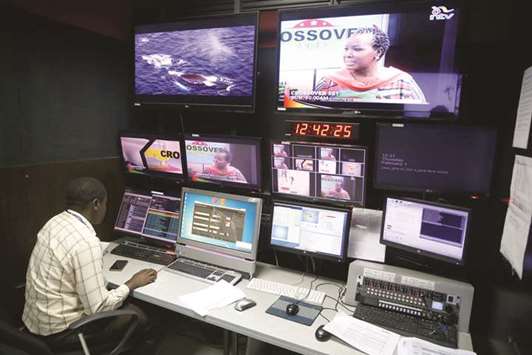Judge Chacha Mwita ordered the two-week reprieve in order to hear a petition by activist Okiya Omtatah Okoiti that described the gag as “grossly arbitrary, disproportionate, oppressive, and unreasonable.”
The three private stations – Citizen, NTV and KTN – were shut off on Tuesday morning as they broadcast opposition supporters gathering for the swearing-in of their leader Raila Odinga as “people’s president”.
They had defied orders by President Uhuru Kenyatta himself, who summoned media bosses last Friday and “expressly threatened to shut down” any station broadcasting the event, the Kenya Editors’ Guild said in a statement.
While authorities allowed the mock inauguration to go ahead, Interior Minister Fred Matiang’i warned on Wednesday that investigations were underway, prompting fears and rumours over imminent arrests.
The lawyer and MP who swore Odinga in – T J Kajwang – was arrested on Wednesday afternoon and police fired teargas to disperse his supporters ahead of a planned court appearance yesterday.
Meanwhile armed plainclothes police officers, were stationed on Wednesday night outside the headquarters of Nation Media Group, which runs NTV, according to Linus Kaikai, a Nation journalist.
Warned by police sources that they would be arrested if they stepped outside, Kaikai and two of his colleagues stayed in the office overnight.
“It’s plain intimidation,” said Kaikai.
“If there’s an issue they could call us to the police station. Why come here to arrest at night? It’s not so much a legal process as a psychological game, to try and break you.”
“It is a very sad moment for media freedom in this country and as the fraternity that we are in together with civil society organisations, we must stand together because if we don’t, then we will perish, we will go back to the days when we don’t even want to remember,” said Tom Mshindi, the Nation Media Group’s editor in chief.
Matiang’i accused the media houses of “complicity” in opposition efforts to “overthrow” the government and had said they would remain shut pending investigations.
“This could’ve been a complete non-issue,” said Nanjala Nyabola, a political analyst, “instead, they’ve given people a rallying point.”
“It’s reinforced the idea that the Kenyatta administration is an authoritarian one, undoing the legacy of free speech that people take very seriously.”
Despite the apparent reprieve, veteran anti-corruption activist John Githongo finds a queasy familiarity in what is going on.
“This takes us back to the 1980s,” he said, a time of authoritarianism under president Daniel arap Moi, a “much darker more restrictive age” when democracy was still a dream.
The freedoms Kenyans enjoy today were hard-won over many years and are jealously protected, though they remain imperfect.
Last year’s election was “a complete mess” said Githongo: the initial August poll was annulled by the Supreme Court and the subsequent rerun boycotted by the opposition.
That handed Kenyatta a landslide victory and a crisis of legitimacy as 60% of voters stayed at home.
“This is a government that is running out of options so is resorting to a sharp authoritarian turn,” he said.

